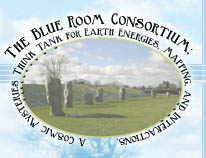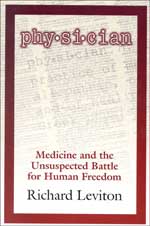

Books and Free Excerpts |
|

Our democratic rights are compromised in areas we're not normally aware of and wouldn't think to examine for infringements. A medicial view is not only philosophical, but political and spiritual - awesomely so. Our choice (or, through passivity, nonchoice) of paradigm makes all the difference in how we experience and manage the world and how we bodily fulfill our lives. A paradigm is implicitly political - the foundation in fact of all political views, policies, and programs. The freedom of medical view (which implies the right to practice) is the core democratic right, because it effects us at the molecular, immunological foundations of our being. As I'll argue in this book, that fundamental democratic freedom is at present indefensibly abrogated by an enforced , exclusive, monopolistic allopathic medical system. As we're painfully learning, the agricultural practice of monoculture - single crop domination - ruins farmland, depleting its immunological vitality. Similarly, we're on the verge of learning that the medical practice of monotherapy - single therapeutic view, dominated by allopathy - ruins human health, depleting our immunological competency. Either way, whether the context is agriculture or immunology, it's a vitiation of our precious environment through practices founded on faulty premises. It all follows, inevitably, from how we position things - our body, our ecosystem - in what conceptual framework we embed them. The verb "position" describes an active, creative process of consciousness, far more dynamic an event than the verbs "perceive" or "conceive" convey, and more comprehensive, too, than the related verb, "construct." Position includes the functions of perception, conception, and construction, but takes the process further. But it's all done on the sly: we position environment, then officially deny it, pleading this is how reality really is, that it's not the relative result of our positioning. From here it's not such a great progression to victim status, in which we become victims of our own positioning; America, as we know, is increasingly (if oxymoronically) the land of the activist victim - "a nation of victims," as one commentator observes, or "a culture of complaint," in the view of another. The pivotal issue in positioning environment, and one that sharply divides the allopathic and empiric paradigm, is consciousness. Consciousness - unilateral, synoptic awareness that is self-reflexive, aware of itself being aware, aware of its primal potency - is the core and foundation of being human. Is it present or is it absent? Is it competent or ineffectual, primary or secondary, active or passive? Is it commissioned or paralyzed? The allopathic view asserts that consciousness is the secondary by-product of physical, material processes, a transient, biologically-dependent bodily resident; but the empirical model argues the formative primacy of consciousness, that consciousness is biologically-interdependent, the immortal mother of material processes. The debate comes down to a crucial metaphysical question: does matter produce and form consciousness or does consciousness effect, shape, even form, matter? Health - our inner immunological and the outer ecological - hangs in the balance. What position shall we take? This in itself is a democratic right, however strange and disastrous when it's executed - to conceive of environment wrongly. If we decide affirmatively, that human consciousness is a primogenitive, formative, residential force, legitimately occupying our environment from T-cells to mountains, then the issue of environment suddenly reconfigures and we see immunology and ecology in their correct context, as equivalent, coincident environmental concerns malleable through directed human consciousness. AIDS is an ecological concern, ozone depletion is an immunological concern, both are distortions of environment. In light of this reconfiguration, the enforced domination of one paradigm - in this case, the allopathic in our acutely medicalized America - is philosophically mistaken, sociologically criminal, and environmentally antidemocratic. Allopathy is more than a therapeutic style. It is a philosophy, a politics, and an ideology that positions the human self (whose core is consciousness) in opposition to the environment, both inner and outer. Disease invades the human, creating illness; medicine overpowers the infectious agents, restoring health. That's how allopathy positions the disease-health process; it's the classic nineteenth century germ theory as put forth by Louis Pasteur. But for empirics - practitioners of holistic, complementary, energy medicines such as homeopathy, naturopathy, acupuncture, herbalism, and chiropractic - disease is precipitated by internal susceptibility and managed by microbial agents as a consequence of aberrations of self; healing is generated when the innate life force is encouraged to restore homeostasis and the self regains coherency. In the allopathic model, the self is disenfranchised, a passive consumer of medical care; in the empiric view, the self (or consciousness) is the prime player on whose behalf the biological drama of illness is undertaken. The underacknowledged political dialectic of our time is being waged in medicine by physicians. Medicine is a philosophy, a paradigm of the human, and thereby tacitly political. Our health, immune function, intellect, emotionality, spirituality, and evolution, both personal and phylogenetic, hang in the balance. What is most crucially at stake is the freedom of the physis , the vital human life force - the autonomous, spontaneous, purposeful nature, the organisimic vitality and living force within biology. Chinese medicine calls it chi ; the Western metaphysical tradition calls it the etheric body ; homeopathy calls it the dynamis . The physis is that aspect of the human totality that responds to the environment on behalf of the life process when presented with an infection, disease or illness. Physis is the vital life spark in the physical. But whatever we call it, the physis is in jeopardy today. The physis is in jeopardy today because modern scientific allopathy, the prevailing mechanistic, materialist model underlying Western medicine, has commandeered it. Allopathy has hijacked the human physis inwardly through enforced vaccinations, antibiotics, and invasive, militaristic therapeutics, and outwardly through the Medical Practices Acts which guarantee M.D.s a virtual medical monopoly in this country and prohibit or restrict through licensure the free practice of natural physis -friendly therapeutics (most significantly, homeopathy, naturopathy, and acupuncture). Allopathy has commandeered us intellectually by coloring with its biases the way we think about, understand, position, and describe illness. In practical terms this means as individuals we do not have the choice in most instances to allow our organism - the physis - to respond to an illness process in any way other than the allopathic interventionist approach. This is a violation of our medical freedom and an infringement of the basic democratic right of individuality. Following Cartesian dualistic thinking - mind versus body, matter versus spirit, environment versus self, biology versus medicine - allopathy has institutionalized - socially, therapeutically, and politically - a philosophical attitude that says the human body is an inert, unintelligent machine with a lot of plumbing manipulable only by outside biochemical, surgical, or genetic interventions. Consciousness, says allopathy, is an epiphenomenonal side-effect of an efficient, smoothly running system. Since the body is a bionic machine, it can be added to (organ transplants) or subtracted from (surgical excision) according to the technical competence of the physician. Allopathy officially - and legally - keeps us fragmented and unintegrated as humans, alienated from our biological context, the body, and disempowered and disenfranchised with respect to the formative, regenerative, and biology-shaping possibilities of human consciousness. It requires only a slight surrealistic twist to appreciate the hidden meaning in this recent newspaper headline: "Shift is Historic: Federal Decision Allows Doctors to Prescribe Drugs to End Life." Technically, the headline referred to a Federal appeals court decision in New York State allowing physician-assisted suicides, but it may also be read as suggestive of allopathy's inevitable goal: death by drugs. There are already so many conventional drugs that are toxic, even deadly, by "side effect" - "chemotherapeutic" is the euphemism - that now it is official: drugs may be used to kill directly. The vast conglomerate of insurance companies, hospitals, physicians, pharmaceutical companies, and physician trade associations keep this philosophical domination institutionalized through an economic matrix in American society. One of the results is the awesome, untenable, unaffordable $900 billion a year medical services bill - the world's largest - which no agency in the U.S. can possibly pay for anymore. The burgeoning debate about health care reform and possible nationalization of health insurance coverage are bringing these underlying issues to light. Key questions will be forced to the surface: Why are we so sick? Why does medical care cost so much? Are there cheaper, more effective alternatives? One of this book's intentions is to provide a therapeutic and philosophical rationale for the optimistic "yes" to these questions. Buy this book here:
|
Newsletter (Back Issues) | Articles | Primers | About Blue Room | Projects and Research | Workshops and Field Trips | Trainings and Consultations
About the Ofanim | About the Founder-Director | Information for Investors | Links | Contact the Consortium
 Physician: Medicine and the Unsuspected Battle for Human Freedom ( Charlottesville, VA: Hampton Roads Publishing, 2000)
Physician: Medicine and the Unsuspected Battle for Human Freedom ( Charlottesville, VA: Hampton Roads Publishing, 2000)